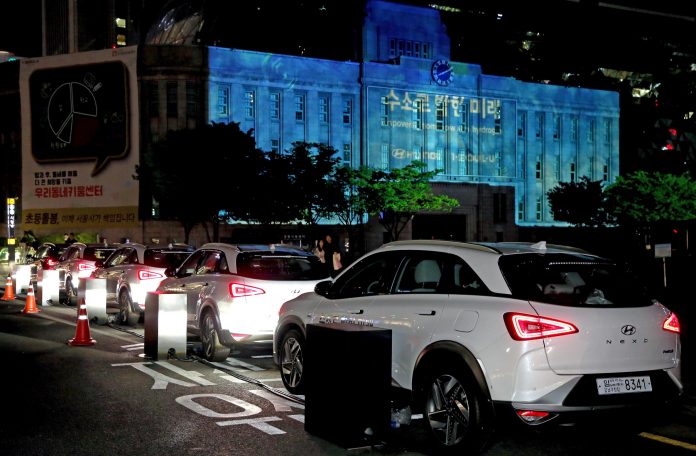- “Empowering Tomorrow with Hydrogen,” a unique spectacle by Hyundai Motor, heightens public awareness of hydrogen fuel cell technology
- Hyundai Motor’s latest fuel cell electric vehicle NEXO used to power projection onto Seoul Metropolitan Library’s facade
- Hyundai spearheads energy transition to hydrogen society, decarbonization
As lights went off at night across Seoul landmarks in celebration of Earth Day 2019, darkening the glitzy, gleaming South Korean capital, the Seoul Metropolitan Library lit up brightly with projections powered by hydrogen fuel cell electric vehicles, the Hyundai NEXOs.
Undulating footages highlighting the whole water-electrolysis cycle — water turning into hydrogen and oxygen, then to kinetic energy, and finally back to water — were beamed onto the building facade using five units of NEXO, the world’s first fuel cell electric SUV from Hyundai Motor Company. The four-minute imagery was projected repeatedly from 8 p.m. for an hour, offering a new vision for future energy.
The event “Empowering Tomorrow with Hydrogen” was organized under the initiative of Hyundai Motor with the support of the Seoul Metropolitan Government.
Hyundai has been the frontrunner of the global effort to incorporate hydrogen technology into urban transport and energy generation over the coming years. Instead of merely turning off lights while still relying on the old model of carbon-intensive electricity generation, the public display showcased the eco-friendly hydrogen fuel cell technology that reduces carbon footprint with a deep commitment to human-centered sustainable development.
The demonstration in the heart of Seoul marks the world’s first instance of its kind using hydrogen fuel cell technology. It also exemplifies an environmentally friendly method of energy generation, as the five NEXOs used were charged at Sangam Hydrogen Station, which uses biogas produced from a nearby landfill to produce hydrogen. The fuel cell stacks in these SUVs were converted to generators to supply electricity to beam projectors, which were themselves individually equipped with power inverters.
Hydrogen is a flexible, versatile energy carrier with favorable characteristics, since it does not release any CO2 at the point of conversion into a clean fuel or energy source, and can play an important role in the transition to a clean, low-carbon energy system. Hydrogen can store energy by converting electrical energy into hydrogen via the process of electrolysis. The element can be produced from renewable energy sources, stored economically, and deployed for a diverse range of industrial and residential energy-generation applications, as well as in fuel cell passenger cars and commercial vehicles.
According to the Seoul Metropolitan Government, the event is designed to catalyze and heighten societal discussions on environmental issues, particularly reducing fine dust and carbon footprint while accelerating decarbonization.
Hyundai Motor is a world leader in the development of hydrogen fuel cell technology, having first commercialized fuel cell vehicles in 2013 with the release of the world’s first commercialized hydrogen-powered vehicle, ix35 Fuel Cell, in 2013. NEXO — Hyundai’s second-generation FCEV with a 609-kilometer range on a single charge (under Korean certification standards) — emits only clean water vapor and purifies the air while driving, filtering 99.9 percent of ultra-fine particles in the process.
Hyundai’s fuel cell powertrain offers an exclusive propulsion solution for everyday vehicles from passenger cars to commercial vehicles. It represents the company’s ongoing commitment to sustainable transport.
The company has begun fostering the growth of fuel cell and other related industries around the world as part of its FCEV Vision 2030. The vision aims to create a worldwide hydrogen society that leverages hydrogen technologies beyond the transportation sector. Hyundai is part of Hydrogen Council, a worldwide CEO-led coalition of over 50 global energy, transport and industry companies united by a long-term vision to develop the global hydrogen society.





